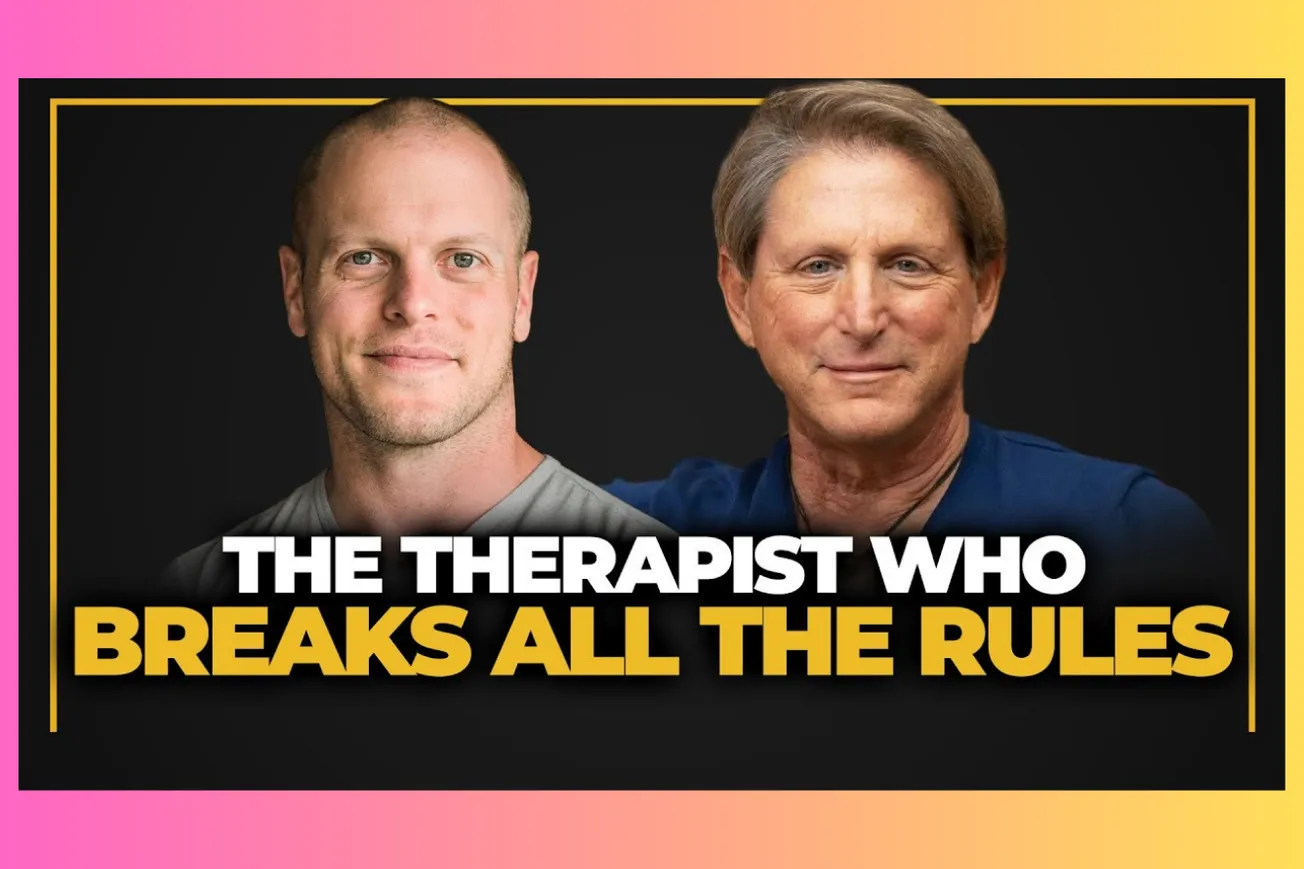Table of Contents
The relationship therapist who breaks all the rules reveals why "calling it like you see it" saves marriages that others can't fix.
Key Takeaways
- Traditional therapy's "neutral mirror" approach often fails because some relationship problems aren't 50/50 splits
- Objectivity battles in relationships are pointless - "who's right" matters less than "how do we work together"
- Normal marital hatred is actually normal - you don't need to panic when you temporarily dislike your partner
- Repair is a one-way street, not a dialogue - tend to your partner first, then take your turn later
- Male depression often hides behind workaholism, rage, or withdrawal rather than showing up as sadness
- Patriarchal conditioning teaches men to disconnect from feelings, creating love-avoidant patterns in relationships
- The best apologies escalate from specific incidents to acknowledging character patterns you're working on
- Relational empowerment beats individual empowerment - "I'm strong and we're a team" works better than "I'm strong, screw you"
- Deal breakers only count after you've dragged your partner to effective couples therapy and they won't do the work
- Healthy masculinity means being whole and adaptable - fierce when needed, tender when needed, knowing which moment calls for what
The Pumpernickel Story: When One Session Changes Everything
Here's how Terry Real describes his specialty: "A couple on the brink that no one else has been able to help." And sometimes, breakthrough happens faster than anyone expects.
The case was a chronic liar married to someone who'd had enough. Most therapists would dig into childhood origins or communication patterns. Terry took a different approach. He recognized the lying as an evasion pattern - classic adaptive child behavior designed to avoid control.
"So I say to him, who controlled you growing up?" Terry asked. Sure enough: military father who controlled everything from how he sat to his choice of friends. "What did that little boy do with that controlling father?" The client smiled - "that mischievous smile of resistance" - and admitted: "I lied."
- Terry's response wasn't judgment but respect: "Be respectful of the exquisite intelligence of that adaptive little boy that you were"
- The strategy worked perfectly for survival: "You did just what you needed to do to get by"
- The problem is context: "You're not that little boy. Your wife is not your father"
- One session, they came back two weeks later hand in hand, done with therapy
But here's the real story. The weekend after that session, the wife sent her husband to get 12 items from the grocery store. He came back with 11. When she asked "Where's the pumpernickel?" every muscle in his body screamed to lie and say they were out of it.
Instead, he took a breath, thought of Terry, and said: "I forgot the goddamn pumpernickel." His wife burst into tears: "I've been waiting for this moment for 25 years."
This is what Terry calls "relational heroism" - the moment when you choose vulnerability over self-protection, even when every fiber of your being wants to do the familiar thing. It's borrowing someone else's prefrontal cortex until your own can take over.
Why Objectivity Battles Destroy Relationships
Most couples spend enormous energy trying to determine who's right about factual disputes. Terry calls this applying "scientific method to your relationship" - and it's completely pointless.
"Objectivity has no place in personal relations," he states bluntly. "The relational answer to who's right and who's wrong is who gives a shit? What matters is how are you and I going to work this thing in a way that's going to work for us?"
Take the classic driving argument. Traditional approach: She says "you're a reckless driver," he says "you're overly nervous," and they marshal evidence to prove their case. Both people argue about tailgating, speed limits, and comparative accident statistics.
Terry's approach transforms this completely. After one session, it becomes: "Honey, I know you love me. Right or wrong, maybe I'm overly nervous. Nevertheless, when you tailgate and switch lanes and speed up, I get crazy, I get scared. When I'm next to you, you don't really want me sitting here being terrified the whole time we're driving. As a favor to me, could you please slow down and drive more conservatively?"
- The magic is moving from objective ("who's the better driver?") to subjective ("this is my experience")
- Instead of fighting about facts, she acknowledges her own possible contribution while making a clear request
- The framework shifts from "who's the authority" to "we're a team"
- His response becomes simple: "Sure" instead of defensive argumentation
What might have been a 40-year fight gets resolved in 15 minutes because it becomes relational rather than factual. There's no threshold of objective data that wins these arguments - even having an audiologist with measurement equipment at a restaurant won't help if you think your partner is yelling at the server.
The Art of Advanced Apologies
Most people think apologizing means saying "I'm sorry." Terry teaches something far more sophisticated - and effective. When your partner confronts you with something difficult, most people go into two orientations: objective reality ("that's not true, that's not accurate") and self-focus ("I can't believe I have to put up with this").
The advanced approach: "Let go of objective reality. Let go of you and take a breath. Enter into compassionate curiosity about your partner's subjective experience."
This means saying things like "That feels bad, honey. Tell me why. Help me understand." When they explain their experience, you acknowledge it without denial, minimization, or rationalization. You land on it.
But here's the PhD-level technique. While most people are told to stay specific and not escalate from incident to pattern to character, Terry teaches the opposite when you're the one being confronted:
- Normal escalation: "You did this" → "You always do this" → "You're this type of person"
- Most relationship advice says don't let your partner do this to you
- But if you do it to yourself, it becomes incredibly powerful
"You're right, I did that. And I can be late - it's an issue, we know that. And when I do that, I'm being thoughtless. I get caught up in the moment, I stop thinking about the impact I'm having. That's really kind of selfish of me. I do have some selfish tendencies. I'm working on it."
Your partner's response shifts from frustration to hope: "Wow, there's hope. This is great." It's the difference between defending against accurate criticism and taking ownership of patterns you actually want to change.
Male Depression: What You Don't See
When Terry wrote "I Don't Want to Talk About It" 30 years ago, depression was seen as a woman's disease. He argued that men experience both overt depression (what we typically recognize) and covert depression - where you don't see the depression, you see what men do to defend against it.
"Self-medication, rage, philandering, radical withdrawal - all of these may be symptoms of an underlying depression," Terry explains. The lucky guy gets a dual diagnosis. The unlucky guy gets treated for addiction without addressing underlying depression, or gets antidepressants while drinking like a fish.
- The ideology behind male depression differs from female depression
- Girls lose their voices and blame themselves; boys are taught to deny vulnerability and disconnect from feelings
- "Normal boyhood trauma under patriarchy" - being forced to cut off half of humanity at ages 3-5
- This disconnection is traumatic and renders boys isolated and lonely
- The trauma becomes depression, which becomes acting out or self-medication
The treatment approach hits all three layers: first the defenses (addiction, rage, withdrawal), then the depression that emerges once those are removed, then the childhood trauma that set everything in motion.
How do you know if addiction is paired with depression? "It's really simple. When the person starts to get sober, do they get depressed?" If someone removes workaholism and feels terrible rather than liberated, there's probably underlying depression that was being medicated.
Terry's approach to trauma work breaks conventional therapy rules by doing it with the partner present. "We like to do trauma work with your partner sitting next to you. And we're unique in that." This fights against what he calls "toxic individualism" - the idea that healing happens in isolation rather than in relationship.
Beyond Traditional Gender Roles: The Masai Warrior's Wisdom
Terry's work challenges both traditional masculinity and reactive feminism. He makes a distinction between political patriarchy (oppression of women by men) and psychological patriarchy (traditional masculinity that damages everyone).
"The essence of traditional masculinity under patriarchy is invulnerability. The more invulnerable you are, the more manly you are. The more vulnerable you are, the more girly you are." This creates what Carol Gilligan calls "the binary" - dividing human qualities into masculine and feminine, with good men having none of the feminine qualities and good women having none of the masculine ones.
The problem: "The things you learned as a boy about what makes a good man are the very qualities that will ensure that by today's standards, you'll be seen as a lousy husband." Women want men's hearts, connection, emotional availability - exactly what traditional masculinity forbids.
Terry's favorite illustration comes from working with Masai warriors in Tanzania. When he asked what makes a good warrior, an elder responded: "When the moment calls for fierceness, a good warrior will kill you. When the moment calls for tenderness, a good warrior will lay down his sword and shield and be sweet like a baby. A great warrior is a man who knows which moment is which."
- Health means being whole and adaptable rather than locked into rigid roles
- Both men and women need to move beyond traditional gender constraints
- Men must access vulnerability and open their hearts
- Women must access assertion with love, not harshness
- The goal is power-with rather than power-over relationships
This creates what Terry calls the shift from individual empowerment ("I was weak, now I'm strong, go screw yourself") to relational empowerment ("I was weak, now I'm strong, I love you, we're a team, let's work together").
Deal Breakers and When to Walk Away
Terry uses what he calls a "relational reckoning" to help people determine whether to stay or go: "Am I getting enough in this relationship to make grieving what I'm not getting worth my while?"
If the answer is yes, stop complaining and embrace what's good while working for change. If no, then "lean in and fight" - and if that doesn't work, drag your partner to therapy with someone who will actually take sides and be an ally.
Deal breakers only apply after you've genuinely tried working with professional help. They include:
- Active addiction without willingness to address it
- Chronic lying, withholding, or passive aggression
- Rage and mistreatment
- Violations of monogamy contracts
- Untreated psychiatric conditions (anxiety, depression)
- Massive maturity level differences between partners
The key insight: "Basically, do they want to work or not? If you want to work and they don't, you could be done."
Terry's approach to reluctant partners uses both negative and positive leverage. He amplifies the consequences already present ("How fed up are you exactly?") while offering positive outcomes ("Would you like a happier, warmer, sexier partner?"). For men specifically, the appeal to being a better father than they had often works when nothing else does.
For those dealing with grandiosity and entitlement, Terry offers "relational joy" as an alternative to gratification. "Gratification is pleasure, short-term pleasure. Relational joy is the deeper down pleasure of just being there and being connected." Many successful but miserable people have lived their whole lives for gratification without understanding what relational joy feels like.
The work involves three phases: loving confrontation to wake people up to what they're doing that doesn't work, trauma work to understand where these patterns originated, and skills training to replace old patterns with new ones. "IFS doesn't teach skills. A lot of trauma people think you remove the trauma, you don't need to teach skills. That's wishful thinking."
Terry's ultimate message challenges both traditional relationship models and modern individual empowerment movements. Real intimacy requires moving beyond the cultural defaults we were handed - whether that's traditional gender roles or reactive independence. It means learning to be whole human beings who can adapt to what each moment requires, whether that's fierce boundary-setting or tender vulnerability.
The revolution isn't about men becoming more like women or women becoming more like men. It's about everyone becoming more fully human, with access to the complete range of qualities that make relationships work: power and tenderness, assertion and receptivity, independence and connection. That's the only way to build the kind of intimate, sustainable partnerships that people actually want in the 21st century.





![This Bitcoin Opportunity Will Set Up Many Crypto Traders For Success! [ACT NOW]](/content/images/size/w1304/format/webp/2026/01/bitcoin-short-squeeze-opportunity-100k-target.jpg)